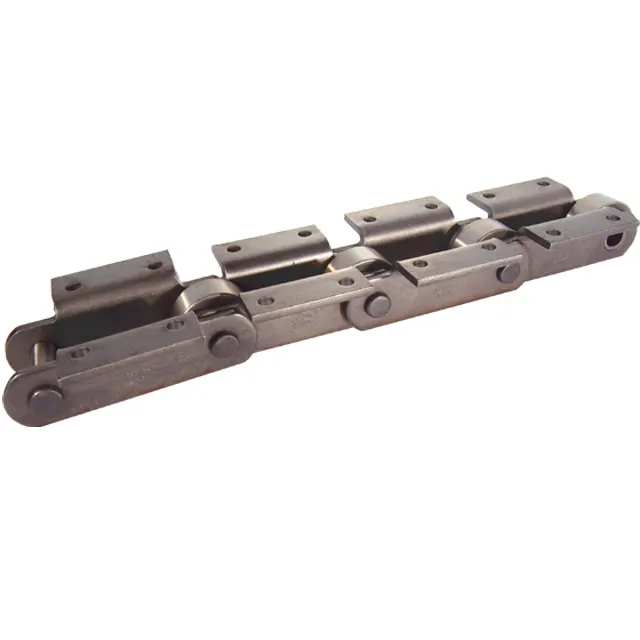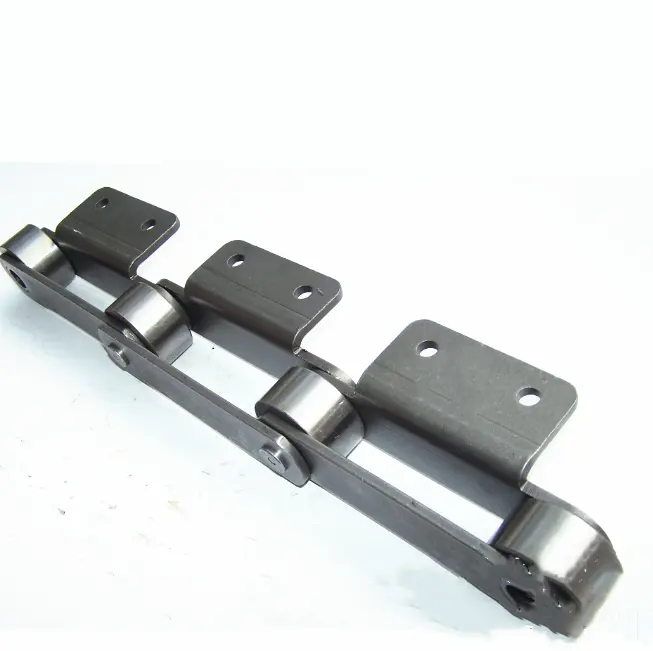Product Description
Product advantages:
| — Ten CoreTechnologies — | |||
| 1 | Chain strengh preload technology | 2 | Pin CRV treatment technology |
| 3 | Plate smoothly punching technology | 4 | Bush oil hole technology |
| 5 | Vacuum Oiled Technology | 6 | Precision Punching Technology |
| 7 | Low frequency fatigue test technology for lange size chain | 8 | Chain length comparison technology |
| 9 | Variation of silence design technology | 10 | Chain dynamic testingtechnology technologies |
Our Advantages:
1. Any inquiry you make will be answered professionally within 6~8 hours.
2. Attaches great importance to product quality and approved by many global quality system certification,such as France, Norway, Germany.
3. Focused on Chain since 1999, have rich experience in Production.
4. High-quality workers,First-class advanced equipment,good quality control,advanced technology.
5. Be Good at Custom-Made Products, provide customized services for customers.
6. Participated in the drafting of 24 national and industrial standards such as chains.As of 2571-Mar, CHOHO has 180 authorized patents.
7. With the responsibility of “Providing high quality chain system with the same service life for the global locomotive industry”, have established a strong R&D team.
By 2571,CHOHO has more than 2,7.
-CHOHO has 4 subsidiaries, including testing technology and international trading companies. has 4 factories in HangZhou, Thailand factory, ZheJiang R&D Center and Tokyo R&D Center. In addition, CHOHO ZHangZhoug Industrial zone is expected to be completed & put into operation next year.
-We specialized in producing all kinds of standard chains and special chains, such as Agricultural Chain, Sprocket, Chain Harrow, Tillage Parts,Rice Harvester Chain, GS38 Chain, Roller Chain, Automobile Chain, Motorcycle Chain Industrial Chain and so on.Our partners among world top enterprises, such as LOVOL,JOHN DEERE,NEWHOLLAND, CLASS,AGCO,DEUTZFAHR,HONDA, KUBOTA etc.
FAQ:
1. Are you manufacturer or trade Company?
We are a factory focused on producing and exporting Chain over 23 years,have a professional international trade team.
2. What terms of payment you usually use?
T/T 30% deposit and 70% against document, L/C at sight
3. What is your lead time for your goods?
Normally 30~45 days.Stock can be shipped immediately.
4. Do you attend any Show?
We attend Hannover show in Germany, EIMA in Italy, CHINAMFG in France, CIAME in China and many other Agricultural machinery shows.
5.Do you offer free samples?
Yes,we can.or you just bear the shipping cost.
6.Is OEM available?
Yes, OEM is available. We have professional designers to help you design.
| Standard or Nonstandard: | Standard |
|---|---|
| Application: | Conveyer Equipment, Agricultural Machinery |
| Surface Treatment: | Polishing |
| Samples: |
US$ 1/Meter
1 Meter(Min.Order) | Order Sample |
|---|
| Customization: |
Available
| Customized Request |
|---|
.shipping-cost-tm .tm-status-off{background: none;padding:0;color: #1470cc}
| Shipping Cost:
Estimated freight per unit. |
about shipping cost and estimated delivery time. |
|---|
| Payment Method: |
|
|---|---|
|
Initial Payment Full Payment |
| Currency: | US$ |
|---|
| Return&refunds: | You can apply for a refund up to 30 days after receipt of the products. |
|---|
How do mill chains perform in corrosive environments, such as chemical processing plants?
Mill chains are designed to perform well in corrosive environments, including chemical processing plants, where exposure to aggressive chemicals and corrosive substances is common. Here’s a detailed explanation of how mill chains perform in such corrosive conditions:
1. Corrosion-Resistant Materials: Mill chains are often made from stainless steel or other corrosion-resistant materials. Stainless steel, in particular, contains chromium, which forms a passive oxide layer on the surface, providing excellent corrosion resistance to many chemicals found in chemical processing plants.
2. Resistance to Chemicals: Mill chains made of stainless steel or other suitable materials exhibit resistance to a wide range of chemicals, including acids, alkalis, and various corrosive substances used in chemical processes. This resistance helps prevent chain degradation and elongation, ensuring a longer service life.
3. Enhanced Durability: The corrosion-resistant properties of mill chains contribute to their overall durability in corrosive environments. They can withstand exposure to aggressive chemicals without experiencing significant deterioration or weakening.
4. Low Maintenance: Mill chains used in chemical processing plants generally require minimal maintenance due to their ability to resist corrosion. This low maintenance characteristic is beneficial in industrial settings where downtime for repairs can be costly.
5. Reliability: In chemical processing plants, reliable equipment is essential for efficient and safe operations. Corrosion-resistant mill chains provide reliable performance, reducing the risk of unexpected chain failure or breakdowns.
6. Material Selection: Proper material selection is crucial when choosing mill chains for chemical processing plants. Engineers and plant operators should consider the specific chemicals used in their processes and select the appropriate chain material to ensure optimal performance and longevity.
7. Resistance to Temperature Extremes: Some chemical processing applications involve extreme temperatures. Mill chains made from high-quality materials can maintain their performance and integrity under such temperature variations, ensuring smooth operation even in challenging conditions.
8. Customization: Mill chains can be customized to suit the specific requirements of chemical processing plants, such as varying chain pitch, attachments, and strength levels to handle different loads and applications.
Overall, mill chains are a reliable choice for corrosive environments, including chemical processing plants. Their corrosion resistance, durability, low maintenance, and ability to withstand various chemicals make them well-suited for handling the demands of chemical processing applications.
What are the temperature limits for mill chains in various environments?
Mill chains are designed to operate within specific temperature ranges depending on the materials they are made of and the intended application. The temperature limits for mill chains can vary based on the environment in which they are used. Here are some common temperature limits for mill chains in various environments:
- Ambient Temperature: Mill chains made of standard carbon steel or stainless steel can typically handle ambient temperatures ranging from -20°C to 150°C (-4°F to 302°F). These chains are commonly used in general material handling applications and conveyor systems.
- High-Temperature Environments: For applications involving high temperatures, such as in steel mills or foundries, mill chains made of heat-resistant materials like alloy steel or specialty coatings can withstand temperatures up to 600°C (1112°F) or more.
- Low-Temperature Environments: In cold storage facilities or freezing environments, mill chains made of materials with low-temperature resistance may be used. These chains can handle temperatures as low as -40°C (-40°F) or even lower.
- High-Temperature Furnace Applications: For use in kilns, ovens, or furnaces in industrial processes, mill chains with specialized heat-resistant materials can endure temperatures exceeding 1000°C (1832°F).
- Chemical and Corrosive Environments: Mill chains used in chemical processing plants or corrosive environments may be constructed with materials such as stainless steel or plastic, which can withstand the specific chemical conditions and temperature ranges associated with those applications.
It is crucial to select the appropriate mill chain based on the temperature requirements of the intended application. Using chains outside their temperature limits can lead to premature wear, decreased performance, and potential safety hazards. Regular maintenance and lubrication are essential to ensure mill chains operate optimally and have a longer service life in their respective temperature environments.
How do mill chains handle abrasive and harsh operating conditions?
Mill chains are designed to withstand abrasive and harsh operating conditions commonly found in various industrial applications. They are constructed using durable materials and specialized designs to ensure reliable performance in demanding environments. Here’s how mill chains handle such conditions:
1. Material Selection:
Mill chains are typically made from high-quality materials like alloy steel, which provides excellent strength and wear resistance. Some chains may also have specific coatings or surface treatments to enhance their durability.
2. Hardened Components:
To increase resistance to abrasion, the components of mill chains such as pins, bushings, and rollers are often hardened through heat treatment processes. This hardening ensures that the chain can endure repeated contact with abrasive materials without significant wear.
3. Specialized Design:
Mill chains may have special design features, such as extended pins or oversized rollers, to reduce contact pressure on the chain’s components. This design minimizes wear and prevents premature failure in abrasive environments.
4. Lubrication:
Proper lubrication is crucial for mill chains operating in harsh conditions. Lubricants reduce friction between moving parts, dissipate heat, and prevent abrasive particles from causing excessive wear.
5. Sealed Joints:
Some mill chains feature sealed joints or special protective covers to prevent abrasive materials from entering critical areas of the chain, further extending its service life.
6. Regular Maintenance:
Even with their robust design, mill chains still require regular maintenance. Scheduled inspections, cleaning, and lubrication help identify potential issues early and keep the chain operating optimally in abrasive and harsh conditions.
7. Proper Chain Tension:
Maintaining the correct chain tension is essential to avoid excessive wear. Proper tension ensures smooth operation and minimizes contact with abrasive materials.
Overall, mill chains’ ability to handle abrasive and harsh operating conditions is a result of their sturdy construction, appropriate material selection, and regular maintenance, making them reliable components in various industrial settings.
editor by CX 2023-11-02



